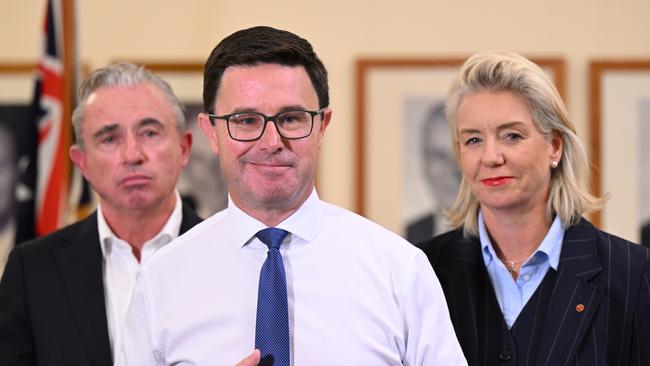Nats hop aboard future fund folly

It reinforces the illusion of “free money” that successive governments across the political spectrum have promoted and ignores recent warnings from S&P Global about the use of off-budget mechanisms to obscure fiscal irresponsibility. Although it may serve short-term political interests it is plainly poor public policy, doing nothing to arrest the persistent lack of fiscal discipline that has plagued Australian governments for the past 25 years.
According to the Nationals, the RAFF would operate by setting aside “a portion of commodity windfall receipts” in an off-budget fund of $20bn. The fund’s earnings would then be used on “building the long-term economic foundations of regional Australia”, whatever this means.
The Nationals casually sidestep the opportunity cost. Commodity windfalls are government revenues that instead could be used to reduce Australia’s almost $1 trillion debt or allocated directly to regional or broader priorities, without resorting to a complex and risky off-budget fund. Nationals leader David Littleproud claims a $20bn fund would support $1bn in annual spending for regional Australia.
What he fails to mention is that using the same $20bn to reduce debt would save about $900m a year in interest payments borne by all Australians.
The Nationals are far from alone in promoting these fiscal pea-and-thimble tricks. Similar reasoning underpins Labor’s Housing Australia Future Fund along with a growing array of other funds covering everything from disaster relief to climate resilience. Today there are six specialised future funds in addition to the original fund created by the Howard government. All should be wound up with the proceeds directed towards reducing debt.
Future fund making has replaced actual budget making. The original Future Fund was created in 2006 to cover unfunded public sector superannuation liabilities by 2020. Unfortunately, precisely none of this has been achieved.
Five years past its target date, not a cent has been spent for this purpose. Currently costing $20bn a year, public sector superannuation liabilities are still paid directly from the budget. What began as a place to store budget surpluses is a tool for masking the true state of accounts. Ask S&P.
Across the parliament, MPs should be asking why Australia continues to have any future funds at all. It starts from a false premise. Defenders of the funds argue they earn more than the government’s cost of borrowing, as though this justifies their existence. But if borrowing to invest is such a sure thing, why doesn’t every deficit-running government just borrow up, invest and eliminate taxes?
The answer is that borrowing to punt on risky assets does not magically create wealth, it merely shifts risk on to taxpayers and distorts capital markets.
The Economist recently wrote of the folly of such thinking, pointing to a landmark 1958 paper from Nobel laureates Franco Modigliani and Merton Miller that showed firms did not create economic value simply by tinkering with their capital structure. Governments are no different.
Swapping taxpayer debt for equity exposure is not a magic pudding. All it does is hide the fiscal truth while introducing risk and volatility. In any event, the Future Fund is not performing that well.
Across the past decade it returned 8.1 per cent annually, less than the 9.3 per cent from the ASX/S&P 200 index. Compared with the largest super funds, it also lags, more so when adjusting for the fact it does not pay tax. The fund’s underperformance regularly goes unchallenged, just like its high expense to income ratio of 2.7 per cent. Or the 300 public servants costing on average $300,000 to oversee contracts with outsourced fund managers who do the actual investing. The fund even counts a four-person travel management team and a government relations executive. A government body employing someone to lobby government.
Instead of proposing a RAFF, the Nationals should advocate for the liquidation of the $308bn squirrelled away in various future funds. Not only would such a move reduce interest payments by up to $13bn a year but it also would create the fiscal headroom to undertake important economic reform. For example, the Nationals could advocate for lower taxes for regional communities instead of engaging in Argentinian-style schemes.
In 1982 Ronald Reagan noted: “We (US) don’t have a trillion-dollar debt because we haven’t taxed enough; we have a trillion-dollar debt because we spend too much.” Perhaps Australia’s political leaders might note the same by promising to reduce spending, including on interest payments.
Dimitri Burshtein is a principal at Eminence Advisory; Alex Sanchez is an economist and former adviser to the Labor government.



The Regional Australia Future Fund, a key demand of the Nationals to maintain its coalition with the Liberals, is a victory of accounting over economics. And questionable accounting at that.